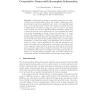Free Online Productivity Tools
i2Speak
i2Symbol
i2OCR
iTex2Img
iWeb2Print
iWeb2Shot
i2Type
iPdf2Split
iPdf2Merge
i2Bopomofo
i2Arabic
i2Style
i2Image
i2PDF
iLatex2Rtf
Sci2ools
128
click to vote
WINE
2005
Springer
2005
Springer
Economic Mechanisms for Shortest Path Cooperative Games with Incomplete Information
Abstract. In this paper we present a cooperative game theoretic interpretation of the shortest path problem. We consider a buying agent who has a budget to go from a specified source node s to a specified target node t in a directed acyclic network. The budget may reflect the level of utility that he associates in going from node s to node t. The edges in the network are owned by individual utility maximizing agents each of whom incurs some cost in allowing its use. We investigate the design of economic mechanisms to obtain a least cost path from s to t and to share the surplus (difference between the budget and the cost of the shortest path) generated among the participating agents in a fair manner. Previous work related to this problem assumes that cost and budget information is common knowledge. This assumption can be severely restrictive in many common applications. We relax this assumption and allow both budget and cost information to be private, hence known only to the respec...
Economy | Node | Shortest Path | Shortest Path Problem | WINE 2005 |
| Added | 28 Jun 2010 |
| Updated | 28 Jun 2010 |
| Type | Conference |
| Year | 2005 |
| Where | WINE |
| Authors | T. S. Chandrashekar, Yadati Narahari |
Comments (0)

